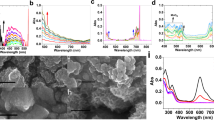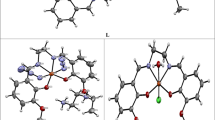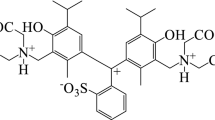Abstract
WE have developed recently1 a method for the micro colorimetric estimation of iron as triphenyl-methylarsonium hexathiocyanato ferrate III, (Ph3MeAs)3(Fe(CNS)6), in which this compound was extracted from aqueous solution with o-dichlorbenzene in the presence of about seventy equivalents of tri-phenylmethylarsonium thiocyanate. The orange-red solution had a sharp absorption maximum at 478 mμ. (curve A), the same wave-length as that observed by Woods and Mellon2 for the ammonium salt (NH4)3(Fe(CNS)6) in water.
This is a preview of subscription content, access via your institution
Access options
Subscribe to this journal
Receive 51 print issues and online access
$199.00 per year
only $3.90 per issue
Buy this article
- Purchase on Springer Link
- Instant access to full article PDF
Prices may be subject to local taxes which are calculated during checkout
Similar content being viewed by others
References
Dwyer, F. P., and Gibson, N. A., (unpublished work).
Woods, J. T., and Mellon, M. G., Intdust. and Eng. Chem. (Anal. Ed.), 13, 551 (1941).
Bjerrum, J., Chem. Rev., 46, 381 (1950).
Author information
Authors and Affiliations
Rights and permissions
About this article
Cite this article
DWYER, F., GIBSON, N. Dissociation of Complex Ions in Non-Aqueous Solvents. Nature 168, 787–788 (1951). https://doi.org/10.1038/168787a0
Issue Date:
DOI: https://doi.org/10.1038/168787a0
Comments
By submitting a comment you agree to abide by our Terms and Community Guidelines. If you find something abusive or that does not comply with our terms or guidelines please flag it as inappropriate.



